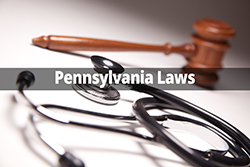Last Updated: Feb 24, 2023
 Does Pennsylvania’s Child Protective Services Law (CPSL) allow for the release of the identity of a health care practitioner providing drug or alcohol abuse services to a minor, given the confidentiality provisions contained in federal and state law? That’s the question that physicians have been asking the Pennsylvania Medical Society (PAMED), and now we have clarification from the state on the issue.
Does Pennsylvania’s Child Protective Services Law (CPSL) allow for the release of the identity of a health care practitioner providing drug or alcohol abuse services to a minor, given the confidentiality provisions contained in federal and state law? That’s the question that physicians have been asking the Pennsylvania Medical Society (PAMED), and now we have clarification from the state on the issue.
The CPSL, Section 6340.1(c)(4), provides that – if requested by the child's primary care physician or a certified medical practitioner who is providing medical care to the child – the county agency, in order to ensure the proper medical care of the child, shall provide the following information as it pertains to circumstances which negatively affect the medical health of the child:
The identity of other certified medical practitioners providing medical care to the child to obtain the child's medical records to allow for coordination of care between medical practitioners.
State and federal regulations do contain various protections for drug and alcohol records. Under state regulations (4 Pa. Code § 255.5), for example, there are protections of client-oriented data relating to drug and alcohol records that are more stringent than federal standards, including the prohibition of releasing certain data that may be utilized to identify the patient.
The issue is, then, whether these protections for drug and alcohol records supersede CPSL provisions which allow for the release of the identity of a health care practitioner providing a minor with drug or alcohol abuse services.
In June 2018, Department of Human Services (DHS) Sec. Teresa Miller, responded to a letter requesting clarification from PAMED President Theodore Christopher, MD. She said that DHS, in consultation with Pennsylvania’s Department of Drug and Alcohol Programs, has determined that the CPSL is not in conflict with state or federal laws surrounding the confidentiality of substance abuse treatment.
Sec. Miller wrote that state and federal law do allow for the disclosure of substance abuse treatment with consent or in an emergency. The CPSL does not provide for disclosure from one practitioner to another or disclosure without any necessary consent. Rather, the CPSL sets forth the county child welfare agency’s disclosure of other medical practitioners who have provided medical care to the child to a medical practitioner who is currently providing care.
Related Resources
PAMED’s Legal Resource Center offers these Quick Consult fact sheets with more details on Pennsylvania’s CPSL and child abuse reporting requirements for physicians:
As a condition of licensure in Pennsylvania, physicians are required to complete a state-approved course on child abuse recognition and reporting. PAMED offers a course that meets those requirements. Get PAMED’s Child Abuse Recognition and Reporting CME Course.
PAMED members with questions about the CPSL or reporting requirements can contact our Knowledge Center at 855-PAMED4U (855-726-3348) or KnowledgeCenter@pamedsoc.org.